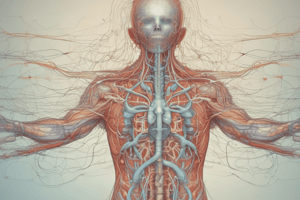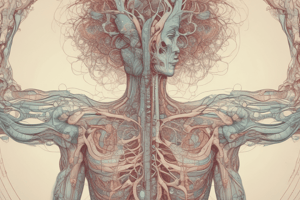Podcast
Questions and Answers
What role does the nervous system play in the body?
What role does the nervous system play in the body?
- It filters disease organisms.
- It controls voluntary muscle movements.
- It collects information for the body and indicates survival actions. (correct)
- It circulates blood throughout the body.
What is the somatic system responsible for?
What is the somatic system responsible for?
Moving the skeletal muscles
What does the autonomic system control?
What does the autonomic system control?
Involuntary muscles
What type of muscles permit movement of the body?
What type of muscles permit movement of the body?
Where are cardiac muscles found?
Where are cardiac muscles found?
What are smooth muscles responsible for?
What are smooth muscles responsible for?
What characterizes skeletal muscles?
What characterizes skeletal muscles?
What is the primary function of the lymphatic system?
What is the primary function of the lymphatic system?
What does the endocrine system do?
What does the endocrine system do?
What is the main function of the circulatory system?
What is the main function of the circulatory system?
Which system is responsible for turning food into energy?
Which system is responsible for turning food into energy?
What is extrinsic motivation?
What is extrinsic motivation?
What defines intrinsic motivation?
What defines intrinsic motivation?
List the stages of change according to the Transtheoretical model.
List the stages of change according to the Transtheoretical model.
What occurs during the precontemplation stage?
What occurs during the precontemplation stage?
What happens during the contemplation stage?
What happens during the contemplation stage?
What is the focus of the preparation stage?
What is the focus of the preparation stage?
What does the action stage signify?
What does the action stage signify?
What characterizes the maintenance stage?
What characterizes the maintenance stage?
What are the three stages of pregnancy?
What are the three stages of pregnancy?
What occurs in the first stage of pregnancy?
What occurs in the first stage of pregnancy?
What is true about the second stage of pregnancy?
What is true about the second stage of pregnancy?
What is key about the third stage of pregnancy?
What is key about the third stage of pregnancy?
What are the characteristics of the first stage of labor?
What are the characteristics of the first stage of labor?
What happens during the transition period of labor?
What happens during the transition period of labor?
What occurs during the second stage of labor?
What occurs during the second stage of labor?
What happens in the third stage of labor?
What happens in the third stage of labor?
Define a nuclear family.
Define a nuclear family.
What characterizes an extended family?
What characterizes an extended family?
What is hospice care?
What is hospice care?
What is Alzheimer's disease?
What is Alzheimer's disease?
What defines dementia?
What defines dementia?
What are barbiturates?
What are barbiturates?
How are inhalants commonly used?
How are inhalants commonly used?
What are amphetamines?
What are amphetamines?
What are hallucinogens?
What are hallucinogens?
What defines stimulants?
What defines stimulants?
What is true about depressants?
What is true about depressants?
What is malfeasance?
What is malfeasance?
What is misfeasance?
What is misfeasance?
Define nonfeasance.
Define nonfeasance.
What is contributory negligence?
What is contributory negligence?
What is comparative or shared negligence?
What is comparative or shared negligence?
How can injuries be avoided in school and physical activities?
How can injuries be avoided in school and physical activities?
What is formative assessment?
What is formative assessment?
What is HIV?
What is HIV?
What does AIDS stand for?
What does AIDS stand for?
What are common symptoms of a UTI?
What are common symptoms of a UTI?
What is mononucleosis commonly known as?
What is mononucleosis commonly known as?
What are some symptoms of mononucleosis?
What are some symptoms of mononucleosis?
Describe influenza.
Describe influenza.
What is tuberculosis (TB)?
What is tuberculosis (TB)?
What is NGU?
What is NGU?
What is chlamydia?
What is chlamydia?
What are symptoms of chlamydia?
What are symptoms of chlamydia?
What is HPV?
What is HPV?
What is PID?
What is PID?
What is syphilis?
What is syphilis?
What is the first stage of syphilis?
What is the first stage of syphilis?
What occurs in the secondary stage of syphilis?
What occurs in the secondary stage of syphilis?
What happens during the latent stage of syphilis?
What happens during the latent stage of syphilis?
What is herpes?
What is herpes?
What does herpes simplex 1 cause?
What does herpes simplex 1 cause?
What does herpes simplex 2 cause?
What does herpes simplex 2 cause?
What is gonorrhea?
What is gonorrhea?
What is diabetes mellitus?
What is diabetes mellitus?
What are chancroids?
What are chancroids?
What is cholesterol?
What is cholesterol?
What are triglycerides?
What are triglycerides?
What are lipoproteins?
What are lipoproteins?
What distinguishes high density lipoproteins?
What distinguishes high density lipoproteins?
What distinguishes low density lipoproteins?
What distinguishes low density lipoproteins?
What is hypertension?
What is hypertension?
What is systolic blood pressure?
What is systolic blood pressure?
What is diastolic blood pressure?
What is diastolic blood pressure?
What is carcinoma?
What is carcinoma?
What are sarcomas?
What are sarcomas?
What are leukemias?
What are leukemias?
What are lymphomas?
What are lymphomas?
What is ADHD?
What is ADHD?
What is OCD?
What is OCD?
What is hepatitis?
What is hepatitis?
What is Lyme disease?
What is Lyme disease?
What is a myocardial infarction?
What is a myocardial infarction?
What constitutes Class I obesity?
What constitutes Class I obesity?
What constitutes Class II obesity?
What constitutes Class II obesity?
What constitutes Class III obesity?
What constitutes Class III obesity?
What is surface reflection in teaching?
What is surface reflection in teaching?
What is pedagogical reflection?
What is pedagogical reflection?
What is critical reflection in teaching?
What is critical reflection in teaching?
What is self-reflection?
What is self-reflection?
What are the three phases of motor learning?
What are the three phases of motor learning?
What occurs in the cognitive phase of motor learning?
What occurs in the cognitive phase of motor learning?
What defines the associative phase of motor learning?
What defines the associative phase of motor learning?
What characterizes the autonomous phase in motor learning?
What characterizes the autonomous phase in motor learning?
What is spatial intelligence?
What is spatial intelligence?
What is natural intelligence?
What is natural intelligence?
What defines intrapersonal intelligence?
What defines intrapersonal intelligence?
What is interpersonal intelligence?
What is interpersonal intelligence?
What are the personality types?
What are the personality types?
What characterizes a Type A personality?
What characterizes a Type A personality?
Flashcards are hidden until you start studying
Study Notes
Nervous System
- Collects information and dictates survival actions based on current conditions.
Somatic System
- Controls movement of skeletal muscles.
Autonomic System
- Regulates involuntary muscles, including the heart.
Muscular System
- Facilitates body movement through three types of muscles: smooth, cardiac, and skeletal.
Types of Muscles
- Cardiac Muscles: Exclusive to the heart.
- Smooth Muscles: Found in internal organs.
- Skeletal Muscles: Under voluntary control.
Lymphatic System
- Filters disease-causing organisms and manages production of antibodies and white blood cells.
Endocrine System
- Produces and secretes various hormones essential for body functions.
Circulatory System
- Distributes blood to provide nutrients to cells and remove waste products.
Digestive System
- Converts food into energy via the gastrointestinal tract and accessory organs.
Types of Motivation
- Extrinsic Motivation: Driven by external rewards or outcomes.
- Intrinsic Motivation: Stem from internal desires to accomplish tasks.
Stages of Change (Transtheoretical Model)
- Includes Precontemplation, Contemplation, Preparation, Action, and Maintenance phases.
Labor Stages
- First Stage: Contractions begin, cervix opens.
- Second Stage: Baby moves through the birth canal.
- Third Stage: Expulsion of the placenta.
Family Structures
- Nuclear Family: Consists of two parents and their children.
- Extended Family: Includes additional relatives.
Health Care Concepts
- Hospice: Care for individuals nearing end of life.
- Alzheimer's Disease: A degenerative brain disorder affecting memory and communication.
- Dementia: A chronic condition leading to confusion and disorientation.
Substance Abuse
- Barbiturates: CNS depressants that induce drowsiness.
- Amphetamines: Stimulants that enhance energy and alertness.
- Hallucinogens: Cause significant alterations in perception.
STDs and Health Conditions
- HIV: Weakens immune defenses, making individuals vulnerable to infections.
- AIDS: Progressive condition resulting from untreated HIV.
- Chlamydia: Common bacterial infection, often asymptomatic.
- Herpes: Lifelong viral infection causing sores.
Obesity Classification
- Class I: BMI 30.0-34.9
- Class II: BMI 35.0-39.9
- Class III: BMI 40.0 or greater
Negligence Types
- Malfeasance: Illegal actions by a teacher.
- Misfeasance: Lawful actions that result in harm.
- Nonfeasance: Failure to act, resulting in student injury.
Health Risks
- Hypertension: Elevated blood pressure due to heart contractions and vascular resistance.
- Cholesterol: High levels increase heart disease risk.
- Diabetes Mellitus: Endocrine disorder increasing risk for various health issues.
Reflection Levels for Teachers
- Surface Reflection: Focus on achieving basic goals.
- Pedagogical Reflection: Involves understanding educational theories and practices.
- Critical Reflection: Examines ethical implications of teaching methods.
- Self Reflection: Evaluates personal beliefs impacting teaching effectiveness.
Motor Learning Phases
- Cognitive Phase: Understanding a skill.
- Associative Phase: Refining movements through practice.
- Autonomous Phase: Mastery of motor skills.
Types of Intelligence
- Spatial Intelligence: Problem-solving in navigation and visualization.
- Intrapersonal Intelligence: Understanding one’s emotions and using that knowledge for personal growth.
- Interpersonal Intelligence: Recognizing and interpreting the emotions of others.
Personality Types
- Type A Personality: Competitive and highly driven, often associated with stress-related health problems.
Studying That Suits You
Use AI to generate personalized quizzes and flashcards to suit your learning preferences.




